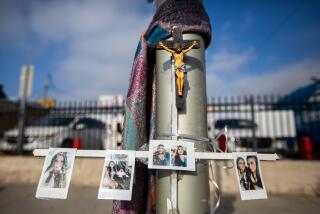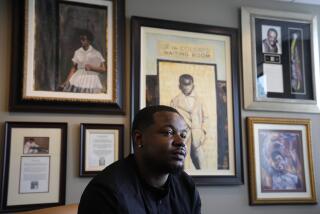Case could turn on eyewitness
- Share via
GUANTANAMO BAY, CUBA — Defense attorneys for terrorism suspect Omar Khadr said Thursday that they learned this week that there was an eyewitness whose testimony could exonerate Khadr of war crimes for his alleged role in an attack on U.S. soldiers.
The prosecution has known about the witness since shortly after the July 2002 firefight in Afghanistan that killed a U.S. medic and left Khadr in the custody of U.S. forces, defenders said.
Khadr has been at Guantanamo since November 2002. He was charged in February with murder, attempted murder, conspiracy, spying and providing material support for terrorism.
The disclosure raised fresh concerns among detainee defense attorneys and human rights advocates about the military commissions set up to try terrorism suspects here.
Khadr’s chief defense lawyer, Navy Lt. Cmdr. William C. Kuebler, told journalists after his client’s arraignment that the witness’ information had been classified by the government and kept from Khadr’s attorneys for the last five years. Even after learning of it Tuesday, Kuebler was prohibited from disclosing many details, even to his 21-year-old client.
The “potentially exculpatory evidence” relates to whether Khadr, then 15, was a “lawful enemy combatant” when U.S. forces attacked a compound where he was holed up with Taliban and Al Qaeda fighters. Khadr was wounded and captured.
The military commissions created by Congress last year were established to try “unlawful enemy combatants,” meaning people who had no right, according to commission rules, to be taking part in a conflict.
The commissions brand the Taliban, Al Qaeda and “associated forces” as unlawful combatants, but defer to Geneva Convention definitions on who is considered a lawful combatant.
Lawful combatants include members of an enemy country’s armed forces, captured soldiers entitled to prisoner-of-war protections, or those meeting four conditions for “irregulars”: that they are under the command of a recognized leader, wear a uniform or insignia recognizable at a distance, carry arms openly and conduct operations in accordance with the laws and customs of war.
Guantanamo detainees were subjected to Combatant Status Review Tribunals three years ago to determine whether they were enemy combatants. But the military commissions rules written by Congress last year required that status reviews specify whether each detainee was fighting lawfully or unlawfully, a distinction not addressed during the previous status hearings.
That lack of clarity halted the arraignments of Khadr and Yemeni terrorism suspect Salim Ahmed Hamdan five months ago, when the judges hearing the cases threw out the charges. The Court of Military Commission Review ruled in September that new status hearings were unnecessary and that the commissions had jurisdiction over the detainees. However, that ruling has been appealed to a federal court in Washington.
During his arraignment, Khadr appeared more relaxed and collaborative with his attorneys than in previous appearances before the commissions. He wore the white linen tunic and pants issued to the most compliant detainees who reside at a communal camp within the Guantanamo sprawl of prisons and cellblocks. His beard was trimmed and his short, wiry hair covered with a black skullcap.
Even if the war-crimes charges are dropped, the Pentagon could -- and likely would -- continue to detain Khadr here indefinitely on the grounds that he could pose a threat to U.S. or other forces if freed.
Khadr was the only one of four enemy fighters surrounded and bombarded by U.S. forces who survived the July 27, 2002, attack. There were no known witnesses to him throwing the grenade that killed Army Sgt. 1st Class Christopher J. Speer, and the Pentagon has never disclosed details of how investigators concluded Khadr threw it.
Despite the new information and the pending federal appeal on whether the commissions have primary jurisdiction in the case, the lead prosecutor, Marine Maj. Jeff Groharing, argued that he should be allowed to present evidence that Khadr was an unlawful enemy combatant.
The government’s evidence includes a videotape purported to show Khadr building explosive devices at an Al Qaeda training camp. Government witnesses had been brought to Guantanamo at considerable expense and effort, Groharing told the presiding judge, Army Col. Peter Brownback III.
“It shows the enormous political pressure . . . to get these trials moving,” Kuebler said of Groharing’s argument, adding that the prosecutor was “practically pounding on the table.”
Jennifer Daskal, senior counter-terrorism counsel for Human Rights Watch, said the courtroom and behind-the-scenes maneuvering were disturbing.
“It is totally outrageous that the prosecution would try to push ahead with a hearing on whether or not Khadr was an unlawful enemy combatant, while all the time withholding from the defense potentially exculpatory information,” she said.
Groharing told reporters in the courtroom that he had been prohibited from talking about the case by the Pentagon’s legal advisor to the commissions administration, Air Force Brig. Gen. Thomas Hartmann.
A spokesman for the Office of Military Commissions, Lt. Col. Rick Helmer, said at a news conference that the prosecutors had conveyed to him that they wouldn’t discuss the case because “they’re going to do their talking in the courtroom.”
Khadr’s arraignment was suspended until at least late January after the charges were read. Brownback allowed Khadr to put off entering a plea to allow lawyers to work out disputes about defense access to prosecution witnesses and evidence.
Brownback also conceded it would be unwise to push ahead with a combatant status hearing when the federal appeals court had yet to rule on the commissions’ jurisdiction over Guantanamo detainees.
It was believed to be the first time a judge in the beleaguered military commission process acknowledged that a civilian court would have the ultimate power to determine the legality of the tribunals and their rules.
--
More to Read
Sign up for Essential California
The most important California stories and recommendations in your inbox every morning.
You may occasionally receive promotional content from the Los Angeles Times.












